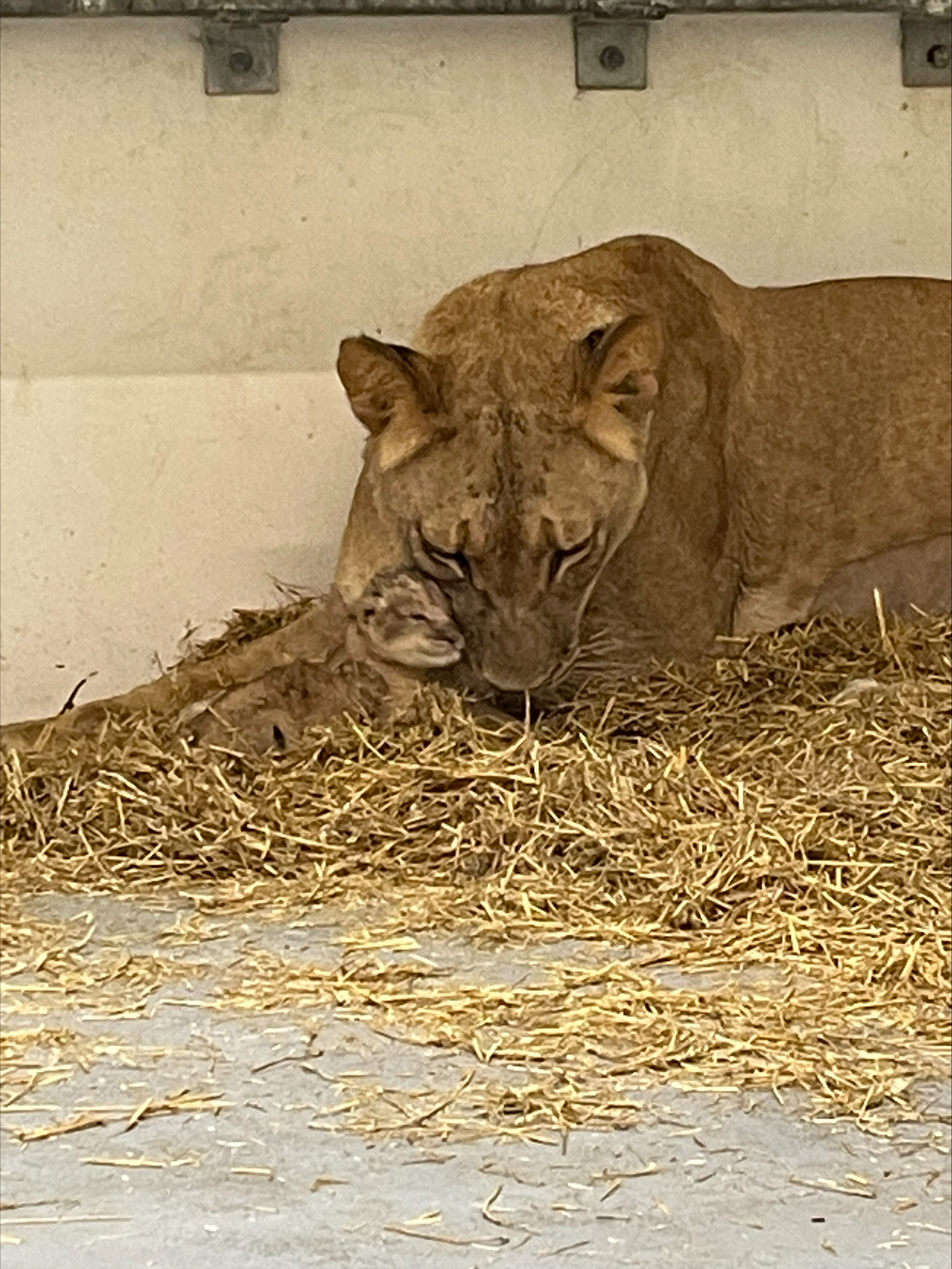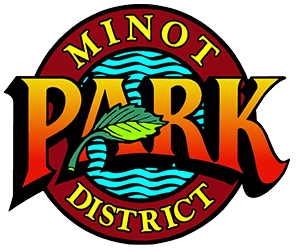
26 Mar Lion Cub Thriving with Supplemental Feeding
FOR IMMEDIATE RELEASE ~
CONTACT PERSON: Jeff Bullock
701-857-4166
MINOT, ND –
On the evening of March 6, 2024, the Roosevelt Park Zoo mobilized a team of zoo staff and local veterinary professionals to perform a C-section on Ilola, a female African lion, once it was determined she could not give birth naturally.
On Wednesday, March 6, the Large Felid keeper noted that Ilola, one of the female African lions, was not behaving normal. She was not interested in engaging with the keeper nor showed any interest in food. She also showed signs of discomfort and was unable to get comfortable for long before having to get up and move around. Based on her behavior, the staff surmised that she was likely in labor.
Zoo staff knew going in that Ilola was delivered via c-section and her mother had to be delivered via c-section so it was likely that once Ilola was bred, there was a high likelihood that her cubs would need to be surgically removed as opposed to giving birth naturally.
Many meetings occurred over the course of the day as we gathered equipment and enlisted the assistance of other veterinary professionals in the area. The decision was made to assemble the team at 6:30 that evening. With limited space to work, those participating were divided into three separate teams. There was a surgical team made up of two veterinarians, a veterinary technician, and an anesthesiologist who would be responsible for conducting the surgery removing the cubs and most importantly ensure Ilola came through the procedure in good shape. A second team was assigned to cub care, made up of a local veterinary technician along with three of our zookeepers. The cub team, or as they wished to be called, the “Cub Crew” was responsible for receiving the cubs once they were removed, cleaning them up and resuscitating them. The final team was the safety team, which the zoo utilizes during any large carnivore immobilization was present to ensure the safety of the people working in and around the immobilized animal.
Ilola was immobilized that evening and x-rayed to determine the number of cubs and their size to make certain our timing was right before putting her through the surgery. Two or three large cubs could be identified, so Ilola was moved to another den in the lion building that had already been prepared for the procedure. The surgical team was able to remove three cubs and as they worked to clean and close her up, the Cub Crew worked feverishly to dry the cubs, clear their airways, warm them up, and get them breathing.
The first cub was not able to be resuscitated at all. Cub #2 was resuscitated and made her way to the incubator. Cub #3 took a while but was finally able to start breathing after a lot of work and eventually joined her sister in the incubator.
Once Ilola was stitched up and ready to be moved, she was returned to her den space that included a den box intended for her to raise her cubs in. The immobilization drugs were reversed and as she began to show signs of waking up, all equipment was removed from the room, and she remained under close observation. At this point, the veterinarians turned their attention to the cubs and made sure that they were doing well.
Ilola was still waking up from the surgery and would be a little sore and confused after the procedure. By 11pm that evening, the two female cubs received their first opportunity to feed from bottles prepared by the staff. Cub #2 took to it well, while cub #3 struggled to nurse. She was ultimately fed by a tube to make sure she had the energy to survive. This started a round-the-clock feeding schedule for the newborn cubs requiring staff to bottle feed them every three hours. As Wednesday turned into Thursday, cub #3 continued to struggle. She would take only a minimal amount of formula prompting staff to give her most of her nutrition via a feeding tube. While she was urinating as normal, she had not passed any feces which was of great concern. As Thursday rolled into Friday, it was apparent that there was something not right with cub #3 and the decision was made at the 5am feeding to go ahead and humanely euthanize her.
Cub #2 was doing well. She drank her bottle voraciously, passing plenty of fecal matter and all-in-all appeared healthy and happy. She remained in human care over the weekend and continued to do well as the next week began. On Wednesday, March 13, the decision was made to reintroduce the cub to Ilola. The cub was wiped down with straw from Ilola’s bedding to mask the smell of humans and coat her with a smell more familiar to Ilola. She was placed in the den adjacent to the den where Ilola’s sister Tadala stayed. When Ilola was moved back into the den with the cub, she immediately went to the cub and started smelling and licking her. This was a good sign and Ilola was showing all the maternal instincts that we had hoped for.
The only problem was Ilola’s milk production. Although we had given her an injection of oxytocin prior to reintroducing the cub, she still did not appear to produce milk, so we began a new treatment that had been successful at other zoos for helping new mothers produce milk. She allowed the cub to nurse and nurse she did, but to what end.
Zoo staff continued round-the-clock feedings as a supplemental effort to ensure the cub was getting enough to eat. Sometimes she would suck a bottle down quickly, but other times she drank a little or none leading us to think that she was getting some nourishment from Ilola, but not enough for staff to just step away. She is weighed each morning and while growth maybe slow, she was still gaining weight.
Currently, the cub remains with Ilola. Feeding times have been adjusted somewhat but continue around the clock. The zoo will continue with the daily weights and supplemental feedings until either Ilola can produce enough milk or the cub gets old enough to eat solid food. As she continues to grow, staff are training her to come over to the front of the enclosure to be fed through the mesh, because it won’t take long before it is too dangerous for keepers to enter the enclosure with her.
For now, we continue to take things day-by-day with regular progress meetings and updates to discuss what if any changes need to be made. Ilola is allowed to spend time with Tadala and Asani, the male, both inside and on exhibit. She recovered well from the surgery and if not for her shaved belly, you wouldn’t know that anything had happened. Not yet three weeks old, it will still be some time before the cub is ready to go outside. She will be systematically introduced to her aunt, Tadala, and her father Asani, in the coming months and once she is big enough, will join the pride on exhibit. Each milestone carries some level of risk, but if she is going to be a part of the pride, will have to take those steps.
Necropsies were performed on both cubs that did not survive and both showed signs of congenital issues that possibly explained their lack of survival. As Ilola was a first-time mom, it is not unusual to have offspring that are not fully functional or developed.
Zoo Director, Jeff Bullock stated, “It’s been a long couple of weeks that feels like months to the staff, as the round-the-clock feedings cause you to lose track of time.” “A lot of work has gone into ensuring the survival of this little lady, and we just want to make sure we are doing everything we can to see it through.” We held off making an official announcement until we were more confident of the outcome, however, we recognize that we’re not out of the woods yet and must remain diligent every step of the way.” “This cub is the first lion cub to be raised at the zoo in over 40 years, with the last time we saw this was 1980.”
BACKGROUND INFORMATION:
Ilola and Tadala were born at the Dallas Zoo on August 17, 2020, and were transferred to Minot on December 11, 2022, along with a breeding recommendation for Ilola. Prior to their transfer, Tadala received a birth control implant to prevent he from getting pregnant as the preference was to breed Ilola.
Asani was born January 11, 2020, at the Audubon Zoo in New Orleans and arrived in Minot on December 11, 2022, as well.
Records indicate that the Roosevelt Park Zoo has held African lions since at least 1965.
Records show that cubs were produced in 1977, 1978, 1979 and the last time in 1980.
Please contact Jeff Bullock at 857.4166 to schedule an interview.


